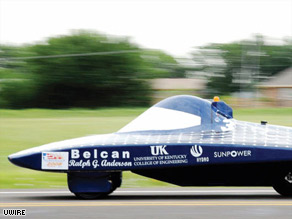Michigan Daily
Charles Gregg-Geist is a writer for the Michigan Daily, the leading news source for the University of Michigan. This article was brought to CNN.com by UWIRE, the leading provider of student-generated content. UWIRE aims to identify and promote the brightest young content creators and deliver their work to a larger audience via professional media partners such as CNN.com. Visit UWIRE.com to learn more.

The University of Kentucky's solar car races along the road, on its way to the finish line.
(UWIRE) -- In the world of higher education, summer is usually the off-season.
But for some students, this summer was the culmination of years of hard work in a 2,400-mile solar car race from Plano, Texas to Calgary, Alberta.
Fifteen teams of students drove photovoltaic-powered cars across the North American Solar Challenge finish line in Calgary Tuesday, led by the University of Michigan Solar Car Team and its vehicle, Continuum.
Placing second was the car Ra 7 from Principia College, followed by the sole European finisher, the German FH Bochum Solar Car Team.
Michigan's victory, which took about 51 hours and 42 minutes on the road, is its fifth NASC championship. The school also won the last NASC, in 2005.
It took Principia almost ten hours more than Michigan to complete the race, in about 61 hours and 38 minutes. Bochum's car took about two hours more, but the University of Waterloo Midnight Sun Solar Car Team was a very close fourth, taking about fifteen minutes longer.
Principia's success may be as noteworthy as Michigan's margin of victory. The college has fewer than 550 students, all of them undergraduates. It's a sharp contrast from the enormous research universities that traditionally win solar car races.
"It's unique, I think, for their college to field a team, (because) they don't have an engineering school," said Dan Eberle, NASC's organizer.
But he noted that small teams have had some success in the past.
"If you can get a group of folks who are really committed, then you can do a lot," he said.

No comments:
Post a Comment